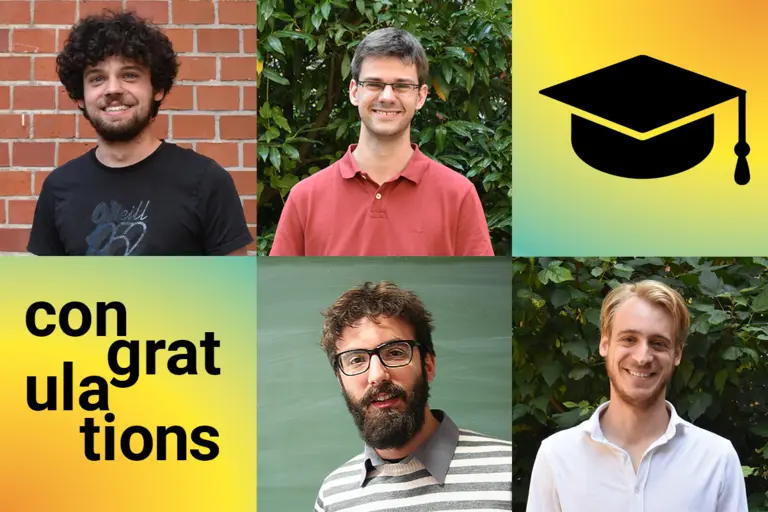
Successful Autumn
Published Dec 2, 2020
During the last weeks, our IMPRS students Tim Seynnaeve, Paul Görlach, Konstantinos Zemas and Orlando Marigliano successfully defended their dissertations at the University of Leipzig. We are very proud and happy that all of them already left us for attractive academic Postdoc positions. Congratulations!
Dr. Tim Seynnaeve
Defense: October 28, 2020
Thesis: “Algebraic geometry for tensor networks, matrix multiplication, and flag matroids”
Advisor: Dr. Mateusz Michałek
The first part of Tim’s thesis is focused on tensors from an algebro-geometric point of view. He studies the geometry matrix product states, certain tensor arising in quantum information theory. Furthermore, by using methods from representation theory he contributes towards determining the complexity of matrix multiplication. In the second part of his thesis Tim investigates matroids, which are central to modern combinatorics. He reviews a beautiful connection between matroids (combinatorial objects) and Grassmannians (geometric objects), and generalizes it to flag matroids and flag varieties.
Tim is now working at the Mathematical Institute of the University of Bern, Switzerland.
Dr. Paul Görlach
Defense: November 10, 2020
Thesis: “Projective geometry, toric algebra and tropical computations”
Advisors: Prof. Bernd Sturmfels and Dr. Mateusz Michałek
The thesis is centered around the interplay of projective geometry with combinatorial structures from toric and tropical algebra. It studies low-dimensional injections of projective varieties, corresponding to a dimensionality reduction technique in polynomial system solving. Moreover, it advances computational methods in tropical geometry and uses them to study degenerations of algebraic families to toric settings.
Paul is now working at the Chemnitz University of Technology, Germany.
Dr. Konstantinos Zemas
Defense: November 11, 2020
Thesis: “Geometric rigidity estimates for isometric and conformal maps from
Advisor: Prof. Stephan Luckhaus
The goal of this thesis is the study of qualitative as well as quantitative stability aspects of isometric and conformal maps from
Konstantinos is now working at the Department of Mathematics of Westfälische-Wilhelms-Universität Münster, Germany.
Dr. Orlando Marigliano
Defense: November 25, 2020
Thesis: “The Algebraic Statistics of Sampling, Likelihood, and Regression”
Advisors: Prof. Bernd Sturmfels and Dr. Christiane Görgen
Orlando's thesis is about statistical models and algebraic varieties. Algebraic Statistics unites these two concepts, turning algebraic structure into statistical insight. The thesis features three types of models that have such an algebraic structure: Linear Gaussian covariance models, Discrete models with rational maximum likelihood estimator, and algebraic manifolds. Orlando closes his thesis with a chapter on mathematics in the sciences featuring case studies from soil ecology and nonparametric statistics.
Orlando is now working at the Math Data Lab at KTH Royal Institute of Technology Stockholm, Sweden.
Scientific Contact
Paul Görlach
Orlando Marigliano
Tim Seynnaeve
Konstantinos Zemas
Editorial Contact
Related Content

Successful Dissertation on Real Algebraic Geometry for Physics and Optimization Successful Dissertation on Real Algebraic Geometry for Physics and Optimization

This Week was MEGA This Week was MEGA

Anna Wienhard is a Plenary Speaker at the ECM 2024 Anna Wienhard is a Plenary Speaker at the ECM 2024


